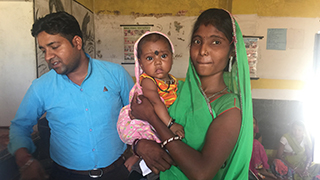eHealth
— Capitalizing on technology to improve health coverage —

Because we firmly believe that digital technology is a precious tool for improving fair access to quality healthcare, the Fondation Pierre Fabre began identifying and supporting the most promising eHealth solutions back in 2016. We focused on initiatives geared to achieving “Universal Health Coverage,” one of the United Nations’ Sustainable Development Goals for 2030.
________
While the Global South is cruelly lacking in medical resources, it has not been left behind in the massive rise in new technologies: with one billion new users every five years worldwide, according to the International Telecommunication Union, cellular network and internet coverage is increasing everywhere on the planet. This digital coverage opens up new perspectives for populations that are not all equal when it comes to geographical location: eHealth brings people closer to healthcare services and makes it easier to keep track of patients. To help local stakeholders make the most of this opportunity, the Fondation Pierre Fabre has put together monitoring, training and research programs tailored to people’s needs.
Exciting potential and a need for structure
Recognized by WHO in 2005, through the adoption of a resolution promoting eHealth at its 58th World Health Assembly, the use of new technologies to improve healthcare is now a reality. Telemedicine, epidemiological follow-up, training, prevention, healthcare coordination, public health initiatives: eHealth takes various forms and has truly taken off since the start of the 2020 health crisis, with significant differences between countries and an ecosystem that is increasingly complex and fragmented. Of those countries that have devised a strategy, few have actually put it into practice.
To support the massive rise of a sector that carries the promise of inclusion and fairness, the Fondation Pierre Fabre has undertaken a number of trailblazing actions:
- Creation of the Global South eHealth Observatory (ODESS) in 2016, a platform for sharing ideas, pooling resources and networking, whose aim is to identify, catalog and support the most promising projects;
- Organization of Annual eHealth conferences, at which the Observatory Prizes are awarded. In total, 32 projects have received backing from the Foundation, and over 160 initiatives are listed in the ODESS database;
- Creation of the first Inter-University Degree in eHealth open to all healthcare stakeholders (especially healthcare professionals and political decision-makers), in collaboration with three African universities (Mali, Senegal, Ivory Coast). In 2023, the program will be joined by a fourth university (Togo), making it possible to reach out to even more students every year;
- Creation of the first Innovation and eHealth center in French-speaking Africa, part of the University of Sciences, Techniques and Technologies of Bamako. Digi-Santé-Mali is a first-rate academic structure that makes a valuable contribution to training and research in the field of digital health.
 |
 |
 |
| The Global South eHealth Observatory — Multi-country — |
The Foundation creates an eHealth degree with four African universities — Mali, Senegal, Ivory Coast, Togo — |
Creation of the National Digital Health Center — Togo — |
 |
 |
|
| Development of a low-cost, open-source echo stethoscope — Multi-country — |
Improving mother and child health – Khushi Baby — India — |
Follow our action
CONFERENCE ODESS 2024
The 2024 Conference of the Global South e-Health Observatory (ODESS) will be held on 10 October 2024 on the central theme of “Breaking Barriers : Gender Equity in Digital Health”.
Twenty-five years ago, the Fondation Pierre Fabre was recognized as a public-interest foundation
This was an essential step for Pierre Fabre, who was personally involved in obtaining that status. This recognition provided the assurance of reliability and steadfast presence, and also authorized the receipt of grants, donations and bequests by virtue of its public-interest mission.
eHealth Hackathon: 50 learners from 13 countries come together in Abidjan
From December 4 to 7, the 50 students from the 5th year group of the “Innovation and Practices in the field of Health" eHealth inter-university program met in Abidjan, Ivory Coast, for a hackathon.







